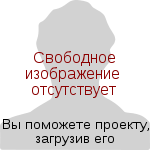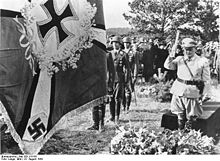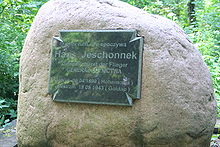- Hans Jeschonnek
-
Hans Jeschonnek 
Born 9 April 1899
Hohensalza, PosenDied 19 August 1943 (aged 44)
Rastenburg, East PrussiaAllegiance  Nazi Germany
Nazi GermanyService/branch Luftwaffe Years of service 1914 - 1943 Rank Generaloberst Commands held Chief of the Luftwaffe General Staff Battles/wars World War I, World War II Awards Knight's Cross of the Iron Cross
Iron Cross I and II Class
Wound Badge
Spange to the Iron Cross
Cross of Honor,
Service award
Combined Pilots-Observation Badge
the Romanian Order of Michael the Brave
/Finnish Order of the Cross of Liberty.Hans Jeschonnek (9 April 1899 – 18 August 1943) was a German Generaloberst and a Chief of the General Staff of Nazi Germany′s Luftwaffe during World War II. He committed suicide in August 1943.
Contents
Biography
Jeschonnek was born in Hohensalza (Inowrocław) in the Prussian Province of Posen. The son of an assistant secondary school master,[1] he studied at the cadet institute of Lichterfelde. He was commissioned as a Leutnant in 1914 and began flying with Jasta {Fighter Squadron} 40 in 1917.[1] By the time World War I ended, Jeschonnek had shot down two enemy aircraft[1] and received the Iron Cross 1st Class and the Iron Cross 2nd Class.
With the creation of the Reichswehr, Jeschonnek participated in the Silesian Uprisings as a member of the Reichswehr's Cavalry Regiment No. 6.[2] He then worked under Kurt Student in the Army Ordnance Department.[2] Jeschonnek graduated from General Staff training in 1928 as the class valedictorian.[2]
Upon graduation, Jeschonnek worked for a department of the Reichswehr Ministry which was responsible for the building of airplanes prohibited by the Treaty of Versailles. He became the adjutant of Erhard Milch in 1933 and was a protégé of Walther Wever. He was promoted to Captain in Bomber Wing 152 in March 1934 and to Major on 1 April 1935. Jeschonnek served as the Commodore of Training Group III of Air Administrative Area I in Greifswald, which tested aircraft, from 1 October 1936-1 October 1937. In the latter year he returned to the Luftwaffe ministry and was promoted to Lieutenant Colonel. Jeschonnek became the Chief of the Luftwaffe Operations Staff on February 1, 1938 and was promoted to Oberst in November of the same year. On 1 February 1939, Jeschonnek replaced Hans-Jürgen Stumpff as the Chief of the General Staff of the Luftwaffe, a position he held until his death. On 14 August 1939, he was promoted to Generalmajor.
On the first day of the invasion of Poland beginning World War II, Jeschonnek called the German Embassy in Moscow to request that the Soviet Union keep its Minsk radio station continually identifying itself, so that German pilots could use it for navigational purposes against Polish targets.[3] He received the Knight's Cross of the Iron Cross on 27 October 1939, after Poland was defeated. With the success of the Luftwaffe in Poland and during the Battle of France, Jeschonnek was promoted to General der Flieger on 19 August 1940.
Although the Luftwaffe had great success during the campaigns against Poland and Battle of France, the poor logistics of the Luftwaffe began to show during the campaigns against Britain, the Soviet Union, and the Mediterranean, especially with the high losses in manpower and materiel. Jeschonnek and Hermann Göring were to blame, as they had underestimated the logistics involved with the campaign.[4] Because Britain continued to resist "the Blitz", Jeschonnek suggested in September 1940 that the Luftwaffe should terror bomb London's residential suburbs, a suggestion declined by Adolf Hitler.[5] Despite the Luftwaffe's failure in the Battle of Britain, Jeschonnek was promoted to Generaloberst on 1 March 1942.
Devotedly loyal[6] to Hitler and feuding with Milch and Göring, Jeschonnek received mounting criticism by Hitler toward the Luftwaffe in general as the branch's capabilities declined during the war. Feldmarshal Albert Kesselring explained:
During the war years, the most impressive personality among the Chiefs of the General Staff was Generaloberst Jeschonnek — an unusually intelligent and energetic person. Even Jeschonnek, however, was not strong enough to oppose Goering successfully (occasionally he did succeed in opposing Hitler) in matters of decisive importance. A very definite lack of harmony brought effective coordination to a standstill.[7]
As part of Operation Crossbow, Allied bombing raids struck Peenemünde; Jeschonnek erroneously ordered Berlin's air defenses to fire upon 200 German fighters who had mistakenly gathered near the Reich's capital. Jeschonnek shot himself at the Wolfschanze in Rastenburg, East Prussia.[4]
Besides the Knight's Cross, other awards to Jeschonnek include the Wound Badge, the Cross of Honor, the Romanian Order of Michael the Brave, and the Finnish Order of the Cross of Liberty.
See also
- Fliegerführer Irak
Notes
References
- This article incorporates information from the revision as of April 4, 2007 of the equivalent article on the German Wikipedia.
- Richard Suchenwirth. Command and Leadership in the German Air Force. Ayer Publishing. 1970. ISBN 0405000510
- William L. Shirer. The Rise and Fall of the Third Reich. Fawcett Crest. New York. 1983. ISBN 0-449-21977-1
- Andreas L. Nielsen. German Air Force General Staff. Ayer Publishing. 1968. ISBN 040500043X
- John Keegan. Who's Who in World War Two. Routledge (UK). 2003 ISBN 0415260337
- Schumann, Ralf (2007). Die Ritterkreuzträger 1939–1945 des LG 1 (in German). Zweibrücken, Germany: VDM Heinz Nickel. ISBN 978-3-86619-013-9.
External links
Military offices Preceded by
noneGeschwaderkommodore of Lehrgeschwader 1
1 October 1936 - November 1936Succeeded by
Oberst Dr. Robert KnaussPreceded by
noneCommander of Fliegerführer Irak
6 May 1941 – 29 May 1941Succeeded by
nonePreceded by
General der Flieger Hans-Jürgen StumpffChief of the Luftwaffe General Staff
1 February 1939 - 19 August 1943Succeeded by
General der Flieger Günther KortenGerman colonel generals and general admirals of the Third ReichColonel general
(Generaloberst)
of the ArmyWilhelm Adam · Hans-Jürgen von Arnim · Ludwig Beck · Johannes Blaskowitz · Eduard Dietl · Nikolaus von Falkenhorst · Johannes Frießner · Werner von Fritsch · Friedrich Fromm · Heinz Guderian · Curt Haase · Franz Halder · Kurt von Hammerstein-Equord · Josef Harpe · Gotthard Heinrici · Walter Heitz · Carl Hilpert · Erich Hoepner · Karl-Adolf Hollidt · Hermann Hoth · Hans-Valentin Hube · Erwin Jaenecke · Alfred Jodl · Georg Lindemann · Eberhard von Mackensen · Erhard Raus · Georg-Hans Reinhardt · Lothar Rendulic · Richard Ruoff · Hans von Salmuth · Rudolf Schmidt · Eugen Ritter von Schobert · Adolf Strauß · Karl Strecker · Heinrich von Vietinghoff · Walter Weiß · Kurt Zeitzler



Colonel general
(Generaloberst)
of the LuftwaffeOtto Deßloch · Ulrich Grauert · Hans Jeschonnek · Alfred Keller · Günther Korten · Bruno Loerzer · Alexander Löhr · Günther Rüdel · Kurt Student · Hans-Jürgen Stumpff · Ernst Udet · Hubert Weise
General admiral
(Generaladmiral)Conrad Albrecht · Hermann Boehm · Rolf Carls · Hans-Georg von Friedeburg · Oskar Kummetz · Wilhelm Marschall · Alfred Saalwächter · Otto Schniewind · Otto Schultze · Walter Warzecha · Karl Witzell
Oberstgruppenführer
(SS or Waffen-SS)Kurt Daluege · Josef Dietrich · Paul Hausser · Franz Xaver Schwarz
Chiefs of the Generalstab of the WehrmachtChiefs of general staff of the Army Ludwig Beck · Franz Halder · Kurt Zeitzler · Heinz Guderian (acting) · Hans Krebs (acting) · Alfred Jodl (acting)
Chiefs of the general staff of the Luftwaffe Walther Wever · Albert Kesselring · Hans-Jürgen Stumpff · Hans Jeschonnek · Günther Korten · Werner Kreipe (acting) · Karl Koller
Chiefs of staff of the Seekriegsleitung of the Kriegsmarine Categories:- 1899 births
- 1943 deaths
- People from Inowrocław
- German military personnel of World War I
- Luftwaffe World War II generals
- Nazis who committed suicide
- German military personnel who committed suicide
- People from the Province of Posen
- Recipients of the Knight's Cross
- Recipients of the Order of Michael the Brave
- Recipients of the Order of the Cross of Liberty
- Suicides by firearm in Germany
- Recipients of the Cross of Honor
Wikimedia Foundation. 2010.


